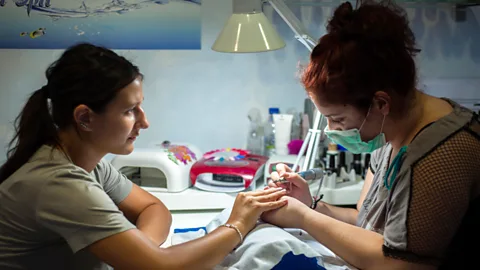What it takes to be young, Greek and able to pay your bills
 Alamy
AlamyContending with one of the world’s worst labour markets, many Greek millennials are ditching dreams of creative, specialised work. Instead, they're making a plan B to get by.
Areti Stabelou, from Athens, has been unemployed since she and 24 colleagues were made redundant from their call centre jobs in July. She didn’t like the work; it was hard and drained her energy. “I was just there for the money – it didn’t give me anything else,” she says.
It’s one of a series of short-term, low-skilled roles the 28-year-old has held since graduating university with a degree in political science in 2011. She hasn’t been able to find anything better.
“I would like to do something creative. When I first left university I wanted to work in political analysis or for a non-profit,” says Stabelou.
But when her parents moved out of the city, she needed an income to live on. “I had to support myself and find any work I could.”
Greek millennials currently face one of the toughest job markets in the developed world. The youth unemployment rate of 40% has been much discussed in coverage of the Mediterranean nation’s almost decade-long financial crisis, but less reported is the issue of underemployment. Those who do manage to find a job often find themselves, like Stabelou, trapped in one tenuous, low-skilled job after the next. The minimum monthly salary – which most graduates earn – has dropped from 800 euros ($920) to 600 euros ($690) since the start of the crisis, and one in four young people are classed as living in poverty. It’s one of the reasons around 250,000 graduates have left Greece to seek work in other countries over the past eight years.
 Areti Stabelou
Areti StabelouStabelou’s experience is typical of many who have graduated since the crisis hit. Their main complaint isn’t necessarily that they can’t find a job at all but rather that they can’t find one that is secure, well paid or matched to their skills. This leaves many bright graduates working as bartenders or waiters in the service industry or doing promotional work like handing out flyers in the streets. Many of these jobs are not declared and so not counted in official employment figures.
According to Dr Michael Arghyrou, a Greek reader in economics at Cardiff Business School, the country’s shadow economy probably accounts for around one third of all its economic activity. “I am sure that much of this is involving young people,” he says. “It affects their personal wellbeing because they feel insecure, and it affects the country’s finances.”
Stabelou admits the experience of struggling to find stable, satisfying work has taken a psychological toll. “In the past I felt very nervous and pessimistic for my future,” she says. “For a period, I was quite depressed – I felt I didn’t have the ability to do anything.” Her most recent period of unemployment has been made easier because she now lives with her boyfriend, who can afford to support her financially and psychologically. “I feel like I have the time now to find out what I want to do in life... I do not want another job like my last one.”
Getting hands on
Other graduates that previously had ‘traditional’ ambitions have decided to retrain in practical trades, such as hairdressing or tattooing.
 Agapi Katroschi
Agapi KatroschiAgapi Katsorchi, 28, who graduated in 2011 with a degree in political science, retrained as a nail technician after struggling to find any type of well-paid work. “I wanted a career that was creative and inspiring. I would have liked to carry on studying, but didn’t have enough money. I was still optimistic [when the crisis hit] but when I finished university I realised how much it had affected our futures,” she says. The summer of 2011, when she graduated, the average Greek wage had fallen by 13%. A 109bn euro ($124bn) bailout was agreed that summer, and strikes and protests brought the country to a standstill.
“My friends and I were all very anxious about finding a job related to our studies, and whether this job would even be permanent. I was lucky because I could live with my parents, but for those who had to live alone it was extremely hard.”
Five months after graduating – two of which she spent in unskilled office roles – Katsorchi noticed an advert for a nail art course. Women’s beauty remains one of the few growth industries in Greece – a well-observed phenomenon known as ‘the lipstick index’, which is common in many depressed economies.
“I always liked doing mine and other people’s nails,” she says. “After I retrained I realised that I actually really like this job. I find it very creative and I am paid well.”
Other graduates have similar stories: one of her colleagues working in nail art has an archaeology degree. Some are skipping university altogether and choosing to pursue trades straight out of high school.
Hacking the future
Some who witnessed the crisis unfold while still teenagers started university knowing a job wouldn’t be a sure thing on the other side. Instead, they have cooked up a plan B, looking for ways to create their own opportunities.
“My dad was without work for several years and it made me realise I couldn’t just wait to finish my studies and find a job – I had to do things for myself, from early on,” says Vasileios Karavasilis, 25, co-founder of games development company eNVy Softworks. His and five other classmates’ solution was to start teaching themselves how to make video games alongside their degrees in computer engineering. “The problem I see is that employers want practical skills which universities don’t teach you,” he says. “And the crisis means companies don’t have any money to train you.”
Karavasili and his friends spent four years studying internet tutorials, seeking out mentors and attending industry events before eNVy found their first client. “It was hard to remain optimistic at times,” he admits. “But after we got one client, it just kept rolling.”
 Vasileios Karavasili
Vasileios KaravasiliSetting up businesses or finding non-traditional ways to create opportunities is a trend Karavasili says he is noticing more among students and recent graduates. “Five years ago, no one was doing that,” he says. “Now there are a lot of student organisations encouraging people to get out of the university mindset, teaching them to develop their own skills and work things out for themselves.
“I think it’s good to encourage this, but we also need to teach people that it’s not easy. Although with the current situation, I don’t think we have any other choice.”
In with the new
Although she is currently out of work, Stabelou feels more optimistic about the future for young Greeks than she was even a year or two ago. “I am seeing more quality jobs advertised now, not just ones in call centres or for promotional work,” she says. “These past 10 years have been very difficult for our generation. But I think young people need to stay in Greece and work to improve the situation and our lives.”
Greece officially exited its bailout programme in August and GDP is predicted to grow by 2.32% in 2019. Prime Minister Alexis Tsipris has promised to raise wages and cut taxes. Economist Arghyrou remains sceptical: he says he believes the country is still overly bureaucratic and not business-friendly enough to create impactful, sustainable growth.
But Stabelou believes her generation is the one that will move the country forward. “All the bad things have been caused by older people. But we are the ones who can bring change.”
